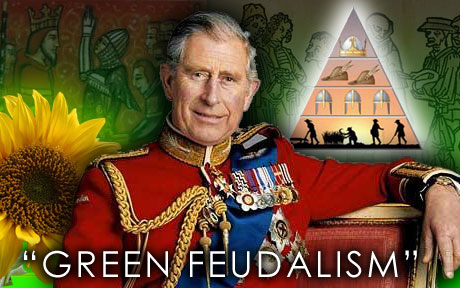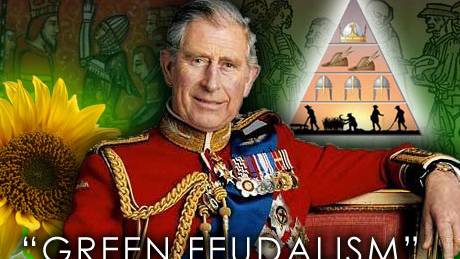The Return of the Aristocrats
Source: spiked-online.com

The real scandal to emerge from the MPs expenses debacle is the demand for even less representative democracy. For certain commentators it seems the best way to restore the British state’s integrity is to reinstate the divine rule of those who ‘know best’ – the aristocracy and the House of Windsor.
Monarchists have leapt upon the expenses scandal in an attempt to rehabilitate the power of the undemocratic sovereign of Britain. For instance, in the Daily Telegraph Simon Heffer argued that the Queen should have a ‘role to play in steadying the ship’ of a battered parliament and that she ‘has the authority to act’ if the legitimacy crisis deepens.
As Brendan O’Neill argued on spiked, such sentiments reveal the institutionalised menace to democracy that the monarchy represents (see Beware the Vultures Circling Westminster, by Brendan O’Neill). Even taking into account the current giddy, panic-ridden behaviour of the political class, it is quite remarkable that such pro-monarchy views are uttered so loudly and proudly in the twenty-first century.
However, in recent years it is not only the usual conservative cranks who have been fawning over the aristocracy and the House of Windsor. Many more radical campaigners and liberals have been equally doe-eyed over the posh. In a recent supplement in the Guardian, a headline that bellowed: ‘Hugh FW for Parliament!’ (This is a chummy abbreviation of the name of upper-class celebrity chef Hugh Fearnley-Whittingstall.) The writer was seriously suggesting that the chef could and should offer leadership for Brits.
In the past Fearnely-Whittingstall, through his television programmes, has lectured us on such crucial issues as organic farming and ‘chicken’s rights’. In these recession-struck times, the Guardian thinks it appropriate to introduce some ‘Hugh FW’ directives forcing us to buy only overpriced, organic fruit and veg and free range chicken.
Other green campaigners and writers would dearly love to see prince Charles control our lifestyles. The lionisation of Charles by liberals is perhaps one of the strangest developments of recent years. Back in the Eighties and Nineties, Prince Charles was widely derided and ridiculed. His views on architecture, organic farming and his habit of talking to plants were rightly lampooned across the political spectrum. Now a weird and alarming reverence surrounds the prince and his nutty pronouncements are taken very seriously indeed.
In 2005 Charles demanded that then US president George W Bush should prioritise tackling ‘global warming’. Hardly an eyebrow was raised over an unelected figurehead finger-wagging at a democratically elected president. To the contrary, he was cheered. The Times (London) asked earnestly ‘should Bush listen to Prince Charles?’, as if he was offering sound and insightful advice.
Charles’ regular global-warming warnings are enthusiastically greeted by green-minded journalists, like when the prince said, in front of industrialists at St James’s Palace, that capitalism and consumerism are destroying the planet. His Rainforests Project – which calls for ‘green economics that recognises that the rainforests are worth more alive than dead’ – was fawned over by the broadsheets and bloggers, too. One newspaper columnist wondered whether Charles ‘should be seen in a great tradition of dissidents who then become leader, such as Nelson Mandela, Vaclav Havel, and Lech Walesa’. A contributor to the newspaper’s online discussion board thanked the prince for using his ‘considerable influence’ to try to change things.
A blogger called him ‘a symbol of environmental awareness’, while the website supergreenme offers pure hagiographic support for Charles. ‘Hopefully the actions of Prince Charles will inspire other leaders to not only promote change, but actually live a green life as well’, it said.
The support from apparent leftists for Charles’ environmentalism is indicative of just how far material aspiration has disappeared from progressive political thinking. After losing the arguments on the economy and social change, liberal left wingers’ promotion of green ideas and ethical living – effectively swapping materialism for moralism – found a welcome ally amongst the upper classes.
For a long time, aristocratic conservatism has laid dormant in British politics, even within the Conservative Party, which first adapted to liberal modernism via the One Nation Conservatism programme and, later, through New Right economic ideas. The old left’s desire to give an ‘anti-capitalist’ twist to environmentalism has only succeeded in giving very posh reactionaries like Zac Goldsmith and Jonathon Porritt an aura of radicalism. But the demands for Charles to ‘use his influence’ are far worse.
Much of modern political history in Britain has been a struggle to shift power from the monarch to parliament - from the hands of individuals who presumed the God-given right to rule and into the hands of those commoners in the House of Commons who stand or fall at the ballot box. The Magna Carta of 1215 limited the absolute power of monarchs; the 1642 to 1651 English Civil War between parliamentarians and royalists further undermined the monarchy; the Bill of Rights of 1689 established the freedom of parliament to make laws and elect its members without royal interference.
The encouragements of Charles to challenge elected officials flies in the face of these historic gains. It is understandable that mainstream politics is held in low esteem these days, but is this really an excuse to grant a future king political authority?
The support and goodwill that surrounds Prince Charles and aristocratic greens also means they are now more likely to get their own way in preventing important development projects. Last month, for example, the heir to the British throne scuppered plans for a £1billion development which was to create 552 new apartments on the 12.8-acre site of the old Chelsea barracks (6). Now, a new design will be put forward.
More generally, the regulations against building on the Green Belt, which toffs at what is now the Campaign to Protect Rural England helped establish in the 1950s, ensure that many of us cannot afford a decent-sized home with a garden. Extraordinary though it might seem, 0.6 per cent of the British people own 69 per cent of the land - and they are mostly the same families who owned it in the nineteenth century (7). Whereas in the past such a backward state of affairs would be an obvious signpost of the deeply class-ridden character of British society, today such an imbalance can be justified in the language of environmentalism, anti-consumerism and even anti-capitalism.
Not long ago, the landed upper classes and royalty were widely despised and mocked, even by those of a moderate political persuasion. They were rightly seen as a barrier to Britain becoming a modern liberal democracy. Now, it seems, many can’t get enough of the upper classes’ ‘green credentials’. From hectoring us on healthy eating to preventing new homes being built, the dead hand of these deadbeats is weighing heavy on ordinary citizens. This is a far bigger scandal than any MP claiming expenses for duck islands, moat cleaning or porn flicks.
Source: spiked-online.com






















